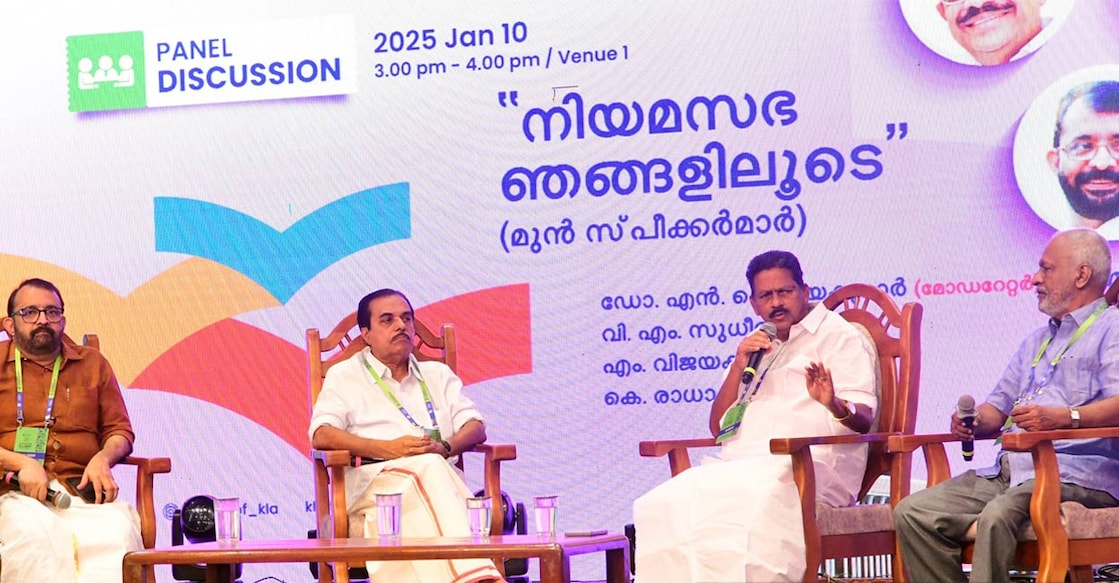How Assembly speakers find it hard to resist partiality and 'bribes'

Mail This Article
Legislative Assembly speakers have perhaps the toughest job in politics. "We should make sure that government business is conducted smoothly and at the same time give the impression that we are sensitive to the needs of the Opposition, too," said P Sreeramakrishnan, the Speaker of the 14th Kerala Legislative Assembly.
But he was candid. "I began my stint promising both myself and the House that I would adapt to the rigours of the job. When I took over as Speaker, I told the House, quoting Napoleon, that in Israel, I would be a Christian, and now that I am in Egypt, I would be a Muslim. It was my way of saying that I would keep my political inclinations in check. But I was not able to keep my promise fully," he said, conceding that as Speaker, he had failed to remain neutral all the time. He even had to face an impeachment motion in the Assembly.
Sreeramakrishnan was speaking at a get-together of former Kerala Assembly Speakers on the sidelines of the Kerala Legislature International Book Festival (KLIBF) at the Kerala Legislative Assembly on Friday, January 10. Six former speakers were supposed to attend. VM Sudheeran, K Radhakrishnan and MB Rajesh, however, could not make it.
N Sakthan, who became Speaker during the tumultuous last phase of the 13th Kerala Assembly, indirectly referenced the unprecedented violence that rocked the Assembly on Budget Day in 2013.
Finding that they could not stop the then finance minister KM Mani from reading the Budget Speech, the LDF members went on a rampage. Even the Speaker's chair was pushed down from its pedestal. Ironically, the man who became the next Speaker, Sreeramakrishnan, was among the furious legislators who desecrated the Speaker's podium.
"I don't want to speak about what happened then," Sakthan said, Sreeramakrishnan seated by his side. "My only wish is that such things will not happen again," he said. He did not embarrass his successor further.
M Vijayakumar, the Speaker of the 10th Kerala Assembly, said that the Kerala Assembly was so ahead of its times that even the Indian Parliament had adopted it as its model. He cited the example of subject committees pioneered by CPI leader E Chandrasekharan Nair when he was law minister. Subject committees were introduced to examine bills introduced in the Assembly and budget proposals thoroughly. "Till then, there was no such detailed vetting," Vijayakumar said. "Parliament found this very innovative and beneficial that it led to the formation of standing committees," Vijayakumar said.
Vijayakumar has a unique distinction. It was during his tenure (1996-2001) that the Kerala Assembly shifted from its old building in Secretariat to the new complex barely 2 km away at PMG Junction.
He also created another first. At his insistence, an Indian President addressed a state assembly for the first time in Indian history. "It was during my time that KR Narayanan was elected President. I went to meet him and just out of courtesy, not in the least hoping that my wish would be granted, invited him to our Niyamasabha. There was no such precedent. Presidents addressed only the joint session of Parliament. They never graced state assemblies," Vijayakumar said. "But the President just thought for a moment and said yes. Even his staff was caught off guard," he said.
The stubborn nature of legislators on both sides of the aisle has given speakers nightmares. Even mischievous but charming persuasiveness can also be problematic.
Sreeramakrishnan said that young Congress MLAs Shafi Parambil and Hibi Eden had the habit of "bribing" him to get a chance to ask supplementary questions out of turn. "They would send me a note addressing me as 'bro' and pleading for a chance to ask supplementary questions. And on these notes would be attached a candy to bribe me," Sreeramakrishnan said. He said he had resisted such bribes most of the time.

